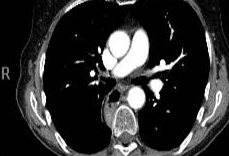A University of Aberdeen oncologist revealed trial results which show patients with a specific type of oesophageal cancer survived longer when they were given the latest lung cancer drug at a major cancer conference.
Dr Russell Petty announced new findings at the National Cancer Research Institute (NCRI) Cancer Conference last week.
Research has found that up to one in six patients with oesophageal cancer has epidermal growth factor receptors (EGFR) duplication in their tumour cells and that for these patients, taking the drug gefitinib, which targets this fault, boosted their survival by up to six months, and sometimes beyond.
This is the first treatment for advanced oesophageal cancer shown to improve survival in patients whose initial course of chemotherapy treatment has failed. It is also the first time a targeted treatment of any kind has proved effective in this disease, although chemotherapy and some targeted drugs have shown benefit in the second line treatment of other cancers of the digestive system including stomach cancer.
The trial – called ‘TRANS-COG’ – was led by Dr Petty and looked at 295 tumour samples from deceased oesophageal cancer patients who had received either gefitinib or a placebo.
Of the 48 patients who had extra EGFR copies in their tumour cells, 13 per cent of those who had gefitinib survived for at least a year, while none of the patients who received a placebo survived that long.
Giving gefitinib to patients who didn’t have extra EGFR copies made no difference to how long they survived. This suggests that EGFR testing could identify a subgroup of oesophageal patients who may benefit from gefitinib.
Dr Petty said: “This is exciting news in our field. It’s the first time any drug has shown survival benefit for oesophageal patients who have stopped responding to their initial treatment. To date there’s been disappointingly little progress in treating this cancer type, which kills nearly 8,000 people a year and sadly is often diagnosed late making it difficult to treat successfully.
“It’s thought that up to 16 per cent of oesophageal cancer patients could benefit from gefitinib, providing valuable extra months of life to people who would otherwise have had very few options available to them.”
Irene Black’s late husband, Roy, was diagnosed with oesophageal cancer in January 2011 aged 78, after having problems swallowing and later being rushed into A&E for an emergency endoscopy. He was given an intense course of chemotherapy and radiotherapy at Aberdeen Royal Infirmary, but unfortunately the cancer stopped responding and the family were told it was incurable. It was then that Roy decided to join the trial.
Irene said: “There is no doubt in my mind that, if it wasn’t for the trial, Roy wouldn’t have been with us for so long. He managed to get back to his bingo, which he loved, surrounded by friends and we booked a four night holiday on the west coast at Fort William. I will always treasure that holiday - if it wasn’t for the trial we may not have had the special time together at the end.
“It’s comforting to know that the trial Roy took part in when he was alive may help patients with this devastating type of cancer live longer in the future.”
Professor Matt Seymour, NCRI’s clinical research director said: “Although the survival benefit for these patients was relatively modest, this trial is an important step forwards for a type of cancer where progress in treatment has fallen behind other cancers in recent decades. While there has been some success in treating other cancers of the digestive system, oesophageal cancer remains extremely difficult to treat, with only 13 per cent of patients surviving five years or more. It will be interesting to see whether this drug, if properly targeted at the right patients, could offer similar benefits to those with earlier stage disease and also whether other drugs that target EGFR could prove to be even more effective.”
The TRANS-COG trial was funded by the Scottish Government’s Chief Scientist Office, the Cameron Clinical Academic Fellowship and the Grampian Gastro-oesophageal Cancer Research Fund (GASTROCAN).
Dr Petty was the chief investigator on the TRANSCOG study .The TRANSCOG trail management group also comprised Professor Zosia Miedzybrodzka ,Professor Graeme Murray, and Dr Asa Dahle-Smith from the University of Aberdeen and Mr David Stevenson, Ms Doreen Massie, Ms Caroline Clark, Ms Aileen Osbourne, and Ms Diane Collinson from NHS Grampian.


